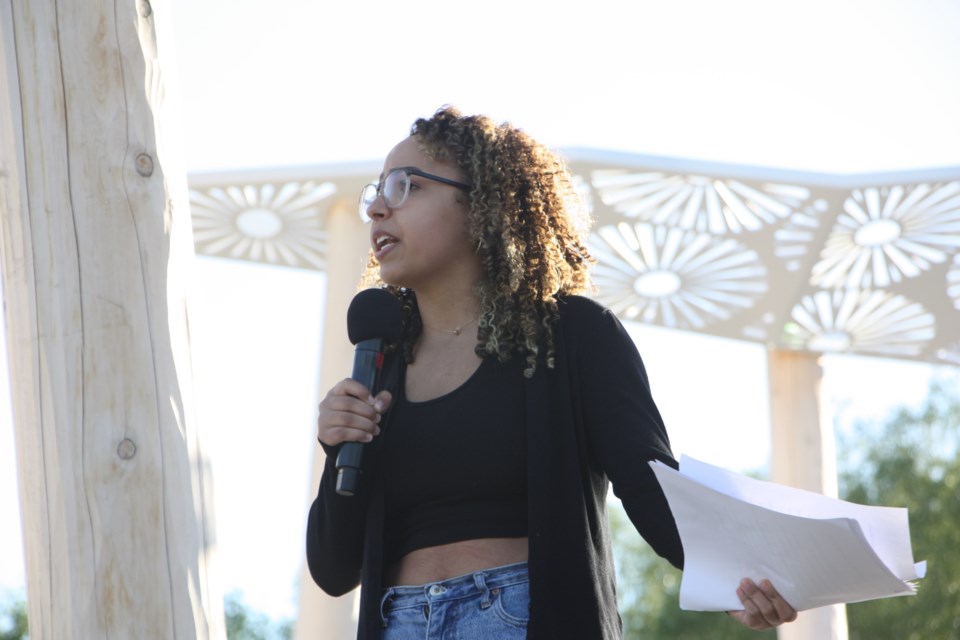For two women of colour living in Collingwood, local Black Lives Matter demonstrations and the changes they have witnessed in themselves and others since then point to hope for a better future.
Marcia Alderson and Anisha Bensdira each spoke passionately at Collingwood Black Lives Matter events this year and both have continued to speak as members of the Unity Collective. The Collective was sanctioned by the town in response to a call to do a better job in embracing diversity and tearing down systemic racism in Collingwood.
It was many sparks that lit a flame inside Alderson this year.
“My skin is very light,” she said. She is the daughter of a Canadian father and Jamaican mother. “I really don’t feel like I’ve been hit in the face with racism. But my family is.”
This year, she noticed a Confederate flag hanging from a home in Collingwood.
“That’s what started to spark things for me,” said Alderson. “I was thinking, this cannot be happening in my town.”
She signed the petition circulating.
And then she and millions watched the death of George Floyd who suffocated while a police officer kneeled on his throat.
“I have family in the States from Jamaica…it was a very personal thing for me when I saw Floyd die,” she said.
She attended the June 8 march expecting a small crowd and arrived to see about 2,000 people gathered.
“It was just absolutely incredible,” she said. “It was just absolutely amazing, it felt like the whole town was there to lift everybody up.
Alderson took up the megaphone at the first Black Lives Matter demonstration in front of town hall. She didn’t intend to speak, but was inspired to share her parent’s story.
Alderson’s father was a realtor, as she is now, and was in the process of helping Alderson’s mother buy a home. The builder said he wouldn’t sell to a Black person. The two took him to court for discrimination and eventually married.
“One of the things I said when I was speaking was we change this world one uncomfortable conversation at a time,” said Alderson. “I think the town woke up…they felt this.”
Alderson attended the second march in Collingwood on June 14. She carried a flag at the front of another crowd of hundreds as they marched down First Street to the Awen Gathering Circle.
There, she and all those gathered heard 17-year-old Anisha Bensdira speak and bring the crowd to its feet as she called for none to be silent and all to be “fixated on justice.”
That speech was a pivotal moment for Bensdira too, who was facing an identity crisis brought on by racism she experienced from a young age.
Bensdira is biracial. Her mom is from Ontario and her dad is from Morocco.
They moved to Collingwood when she was in Grade 2 and she went from a class of mostly people of colour to being the only Black girl in her class.
“I felt like I stuck out…I wanted blonde hair and blue eyes,” she said.
She suffered racist comments, microaggressions and ethnic stereotypes from her peers. Some were deliberately offensive, some were the result of not knowing any better. Grade 6 was the worst.
“Nobody else in my class was getting those comments, so it put me in a really weird position,” she said. “When I was writing my speech, I called my sister distressed and said ‘I don’t know what to say, am I Black? Am I white? How do I write this?”
Her sister told her to be herself.
“I feel like I almost clarified my identity and confirmed it,” said Bensdira. “It was definitely inspiring to see all those people in support and wanting to combat racism in our community. The amount of bodies I saw that day … I was at a loss for words.”
But the words did flow. And struck a chord with those gathered, including her peers.
“I felt empowered,” said Bensdira. “I’m seeing my peers posting ways to combat racism. I’m seeing the racist comments diminish. It’s not 100 per cent, but, it’s getting there.”
She said a weight lifted from her chest after she spoke at the Black Lives Matter march.
“I thought, ‘this is my community and I know who I am,’” she said.
Both Alderson and Bensdira said there is still work to be done, and both see the Unity Collective as important to that work.
“I want the kids in the future generations to grow up without even having to worry if they belong,” said Bensdira. “It shouldn’t have to be a question.”
Alderson wants more stories – like her parents’ – to be told.
“Education is really where we’re going to go,” said Alderson. “I want the Unity Collective to educate the people of this town and to try to create a little more tolerance of diversity. And tell the stories of people of different cultures who are part of this town.”
She is encouraged by the support for the collective and sees it as a way to make voices heard.
Working with Bensdira and other youth on the collective has given Alderson hope for what is to come.
“The next generation, they’re not going to have this. They’re not going to stand for it,” she said. “We have hope in those young people for sure.”



